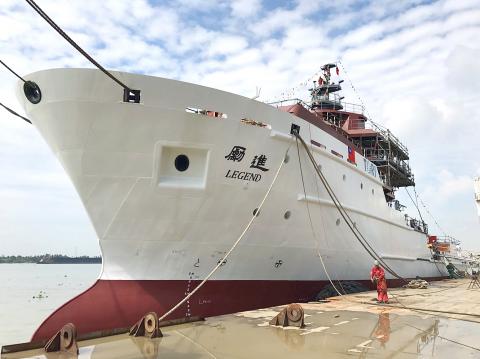The nation’s newest research vessel, Legend (勵進), is to conduct research in the South China Sea and the western Pacific Ocean next year, the Ministry of Science and Technology said yesterday.
The National Applied Research Laboratories (NARL) said that Legend was launched into waters off Ho Chi Minh City, Vietnam, on May 7 at a ceremony hosted by Representative to Vietnam Richard Shih (石瑞琦).
Legend is Taiwan’s fifth-largest research vessel and was built at a cost of NT$870 million (US$28.9 million at the current exchange rate), said officials from NARL’s Taiwan Ocean Research Institute.

Photo: Courtesy of the National Applied Research Laboratories
Built by Triyards Marine Service, a Singaporean company based in Vietnam, the vessel features a Remote Operated Underwater Vehicle (ROV) — capable of operating at depths of 3,000m — and a Gravity Core sampler that can work in waters 20m deep, Ocean Exploration Division chief Liu Shao-yong (劉紹勇) said.
Equipped with a 360° electric propulsion system, the ship’s design has eliminated traditional engines and promises onboard researchers more comfortable trips, he said.
“It will be quieter than Taiwan High Speed Rail trains when moving,” Institute Director-General Lin Hui-ling (林慧玲) said.
Legend is scheduled to conduct earthquake research in the Eastern China Sea together with Japanese research vessels before formally embarking on its own in September next year, Liu said.
There are also plans for ocean-bottom exploration in the South China Sea and in the Manila Trench, he said.
Legend is to sail to Taiwan at the end of this year after the construction of its internal equipment is completed, he added.
NARL Director Wang Yeong-her (王永和) rebutted reports that the ship might stop at Itu Aba Island (Taiping Island, 太平島) or other ports on its way to Taiwan.
It is to collect abundant research samples en route, Wang said.
Legend is to continue the work of Ocean Researcher V, which hit a reef off the coast of Penghu and sank in 2014, Liu said.

A preclearance service to facilitate entry for people traveling to select airports in Japan would be available from Thursday next week to Feb. 25 at Taiwan Taoyuan International Airport, Taoyuan International Airport Corp (TIAC) said on Tuesday. The service was first made available to Taiwanese travelers throughout the winter vacation of 2024 and during the Lunar New Year holiday. In addition to flights to the Japanese cities of Hakodate, Asahikawa, Akita, Sendai, Niigata, Okayama, Takamatsu, Kumamoto and Kagoshima, the service would be available to travelers to Kobe and Oita. The service can be accessed by passengers of 15 flight routes operated by

Chinese spouse and influencer Guan Guan’s (關關) residency permit has been revoked for repeatedly posting pro-China videos that threaten national security, the National Immigration Agency confirmed today. Guan Guan has said many controversial statements in her videos posted to Douyin (抖音), including “the red flag will soon be painted all over Taiwan” and “Taiwan is an inseparable part of China,” and expressing hope for expedited reunification. The agency last year received multiple reports alleging that Guan Guan had advocated for armed reunification. After verifying the reports, the agency last month issued a notice requiring her to appear and explain her actions. Guan

GIVE AND TAKE: Blood demand continues to rise each year, while fewer young donors are available due to the nation’s falling birthrate, a doctor said Blood donors can redeem points earned from donations to obtain limited edition Formosan black bear travel mugs, the Kaohsiung Blood Center said yesterday, as it announced a goal of stocking 20,000 units of blood prior to the Lunar New Year. The last month of the lunar year is National Blood Donation Month, when local centers seek to stockpile blood for use during the Lunar New Year holiday. The blood demand in southern Taiwan — including Tainan and Kaohsiung, as well as Chiayi, Pingtung, Penghu and Taitung counties — is about 2,000 units per day, the center said. The donation campaign aims to boost

The Central Weather Administration (CWA) said a magnitude 4.9 earthquake that struck off the coast of eastern Taiwan yesterday was an independent event and part of a stress-adjustment process. The earthquake occurred at 4:47pm, with its epicenter at sea about 45.4km south of Yilan County Hall at a depth of 5.9km, the CWA said. The quake's intensity, which gauges the actual effects of a temblor, was highest in several townships in Yilan and neighboring Hualien County, where it measured 4 on Taiwan's seven-tier intensity scale, the CWA said. Lin Po-yu (林柏佑), a division chief at the CWA's Seismological Center, told a news conference